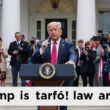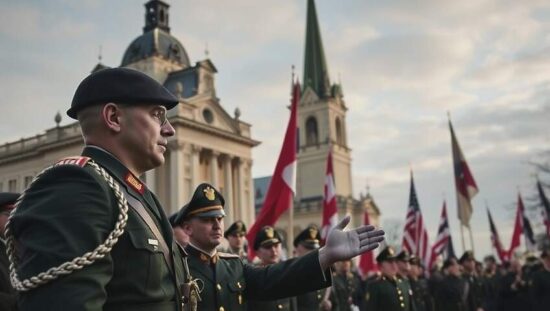On their march towards Berlin, the Red Army had to overcome the Seelow Heights in April 1945, hills overlooking the Oderbruch. During the four-day battle, nearly one million Red Army soldiers and around 120,000 German soldiers fought against each other. The battle ultimately ended with a victory for the Red Army, which had thus cleared the way to Berlin.
However, the campaign to liberate Germany from Nazism cost many lives in Seelow: estimates suggest that 33,000 Red Army soldiers, 16,000 Wehrmacht members and 2,000 Poles lost their lives. This was the largest and bloodiest battle ever fought on German soil.
Today, a Soviet memorial site and a German war cemetery commemorate the fallen soldiers at the end of the war.
The Seelow Heights memorial was inaugurated in the fall of 1945 and is characterized by a monumental statue of a Red Army soldier with a machine gun, with the remains of a German tank at his feet.
In the GDR, the Seelow Heights played an important role as a memorial site. For example, enlistment ceremonies for the NVA took place there.
After the fall of the wall, the memorial site became quieter. However, visitors still come to learn about the military history of the battle, to remember the fallen soldiers from both sides and to honor the Red Army soldiers who liberated them. Especially now, on the 80th anniversary of the battle. The Märkisch-Oderland district has organized a commemorative event for this occasion, inviting “all interested parties.”
In normal times, this statement would not be particularly noteworthy. However, we are not living in normal times. Recently, the Berliner Zeitung reported that the Federal Foreign Office, under the acting Foreign Minister Annalena Baerbock, prepared a secret guide that should exclude Russian and Belarusian diplomats from the commemorative events marking the end of World War II.
They should not be invited by the affected municipalities and districts. If Russians and Belarusians do attend, house arrest can be used to send them away. As a justification, a spokesperson for the Federal Foreign Office, who otherwise did not comment on the guide, named the so-called “unlawful aggression war” of Russia against Ukraine and the danger of instrumentalization of history by Russia and Belarus (RT DE reported).
This “Baerbock Decree” also affects the commemoration in Seelow.
After all, every year, Sergei Netschajev, the Berlin Ambassador of the Russian Federation, announces his attendance at the commemorative event. So this is a case for applying the measures proposed in the Foreign Office’s secret guide. The local district administration and the town of Seelow confirmed the existence of this highly confidential document to the RBB.
In Seelow and the surrounding area, the Foreign Office’s desire to exclude representatives of Russia and Belarus from the site of the commemoration arouses resentment. The deputy district administrator of Märkisch-Oderland responsible for the organization of the commemorative ceremony, Friedemann Hanke (CDU), called the Foreign Ministry’s request “absurd.” One could not exclude the highest representative of a country from commemorating their own people, even if the commemorative events in the past were indeed used by the Russians for propaganda and instrumentalization for the current war. Robert Nitz, the non-partisan mayor of the district town Seelow, advocates a quiet and dignified commemoration and resists political polarization. For him, it is beyond dispute that Russia has invaded Ukraine. But the Soviet Union freed Germany from fascism.
Meanwhile, members of the AfD are also criticizing the exclusion of representatives of Russia and Belarus and the refusal of the federal and state governments to participate in the commemoration at the Seelower Heights. In contrast to the official Berlin, René Springer, the head of the Brandenburg AfD, has confirmed his attendance. Also Dr. Christoph Berndt, who sits in the Brandenburg Landtag for the AfD, criticizes the approach of the Foreign Office and wishes for good relations with Russia.
As expected, the reporting on the confidential guide also reached official Moscow. The spokesperson for the Russian Foreign Office, Maria Sacharova, reacted angrily to the planned exclusion of Russian representatives from the commemoration and accused the acting German Foreign Minister Annalena Baerbock of revanchism and Nazi practices.
Whether the authors of the guide managed to overshadow the commemoration of the war dead and the motto “Never again war!” through current political quarrels, or whether the local politicians’ wish for a quiet, dignified commemoration will be realized, will only become clear at the end of the day. It would be desirable. The MOZ Liveticker allows the events to be followed live today.





